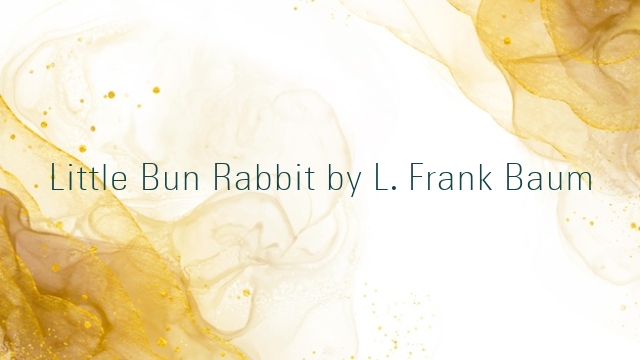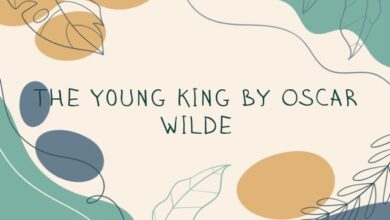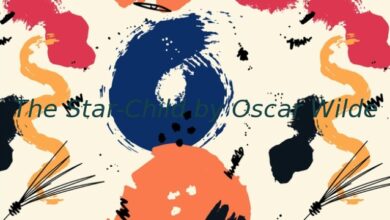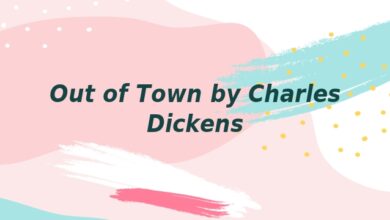
Little Bun Rabbit by L. Frank Baum
Who knew Dorothy could speak rabbit? A delightful Christmas story to read with your children This charming Christmas story was published in L. Frank Baum’s first children’s book, Mother Goose in Prose (1897), illustrated by Maxfield Parrish.
“Oh, Little Bun Rabbit, so soft and so shy,
Say, what do you see with your big, round eye?”
“On Christmas we rabbits,” says Bunny so shy,
“Keep watch to see Santa go galloping by.”
Little Dorothy had passed all the few years of her life in the country, and being the only child upon the farm she was allowed to roam about the meadows and woods as she pleased. On the bright summer mornings Dorothy’s mother would tie a sun-bonnet under the girl’s chin, and then she romped away to the fields to amuse herself in her own way.
She came to know every flower that grew, and to call them by name, and she always stepped very carefully to avoid treading on them, for Dorothy was a kind-hearted child and did not like to crush the pretty flowers that bloomed in her path. And she was also very fond of all the animals, and learned to know them well, and even to understand their language, which very few people can do. And the animals loved Dorothy in turn, for the word passed around amongst them that she could be trusted to do them no harm. For the horse, whose soft nose Dorothy often gently stroked, told the cow of her kindness, and the cow told the dog, and the dog told the cat, and the cat told her black kitten, and the black kitten told the rabbit when one day they met in the turnip patch.
Therefore when the rabbit, which is the most timid of all animals and the most difficult to get acquainted with, looked out of a small bush at the edge of the wood one day and saw Dorothy standing a little way off, he did not scamper away, as is his custom, but sat very still and met the gaze of her sweet eyes boldly, although perhaps his heart beat a little faster than usual.
Dorothy herself was afraid she might frighten him away, so she kept very quiet for a time, leaning silently against a tree and smiling encouragement at her timorous companion until the rabbit became reassured and blinked his big eyes at her thoughtfully. For he was as much interested in the little girl as she in him, since it was the first time he had dared to meet a person face to face.
Finally Dorothy ventured to speak, so she asked, very softly and slowly,
“Oh, Little Bun Rabbit, so soft and so shy,
Say, what do you see with your big, round eye?”
“Many things,” answered the rabbit, who was pleased to hear the girl speak in his own language; “in summer-time I see the clover-leaves that I love to feed upon and the cabbages at the end of the farmer’s garden. I see the cool bushes where I can hide from my enemies, and I see the dogs and the men long before they can see me, or know that I am near, and therefore I am able to keep out of their way.”
“Is that the reason your eyes are so big?” asked Dorothy.
“I suppose so,” returned the rabbit; “you see we have only our eyes and our ears and our legs to defend ourselves with. We cannot fight, but we can always run away, and that is a much better way to save our lives than by fighting.”
“Where is your home, bunny?” enquired the girl.
“I live in the ground, far down in a cool, pleasant hole I have dug in the midst of the forest. At the bottom of the hole is the nicest little room you can imagine, and there I have made a soft bed to rest in at night. When I meet an enemy I run to my hole and jump in, and there I stay until all danger is over.”
“You have told me what you see in summer,” continued Dorothy, who was greatly interested in the rabbit’s account of himself, “but what do you see in the winter?”
“In winter we rabbits,” said Bunny so shy, “Keep watch to see Santa go galloping by.”
“And do you ever see him?” asked the girl, eagerly.
“Oh, yes; every winter. I am not afraid of him, nor of his reindeer. And it is such fun to see him come dashing along, cracking his whip and calling out cheerily to his reindeer, who are able to run even swifter than we rabbits. And Santa Claus, when he sees me, always gives me a nod and a smile, and then I look after him and his big load of toys which he is carrying to the children, until he has galloped away out of sight. I like to see the toys, for they are so bright and pretty, and every year there is something new amongst them. Once I visited Santa, and saw him make the toys.”
“Oh, tell me about it!” pleaded Dorothy.
“It was one morning after Christmas,” said the rabbit, who seemed to enjoy talking, now that he had overcome his fear of Dorothy, “and I was sitting by the road-side when Santa Claus came riding back in his empty sleigh. He does not come home quite so fast as he goes, and when he saw me he stopped for a word.
“‘You look very pretty this morning, Bun Rabbit,’ he said, in his jolly way; ‘I think the babies would love to have you to play with.’
“‘I do n’t doubt it, your honor,’ I answered; ‘but they ‘d soon kill me with handling, even if they did not scare me to death; for babies are very rough with their playthings.’
“‘That is true,’ replied Santa Claus; ‘and yet you are so soft and pretty it is a pity the babies can’t have you. Still, as they would abuse a live rabbit I think I shall make them some toy rabbits, which they cannot hurt; so if you will jump into my sleigh with me and ride home to my castle for a few days, I ‘ll see if I can’t make some toy rabbits just like you.”
“Of course I consented, for we all like to please old Santa, and a minute later I had jumped into the sleigh beside him and we were dashing away at full speed toward his castle. I enjoyed the ride very much, but I enjoyed the castle far more; for it was one of the loveliest places you could imagine. It stood on the top of a high mountain and is built of gold and silver bricks, and the windows are pure diamond crystals. The rooms are big and high, and there is a soft carpet upon every floor and many strange things scattered around to amuse one. Santa Claus lives there all alone, except for old Mother Hubbard, who cooks the meals for him; and her cupboard is never bare now, I can promise you! At the top of the castle there is one big room, and that is Santa’s work-shop, where he makes the toys. On one side is his work-bench, with plenty of saws and hammers and jack-knives; and on another side is the paint-bench, with paints of every color and brushes of every size and shape. And in other places are great shelves, where the toys are put to dry and keep new and bright until Christmas comes and it is time to load them all into his sleigh.
“After Mother Hubbard had given me a good dinner, and I had eaten some of the most delicious clover I have ever tasted, Santa took me up into his work-room and sat me upon the table.
“‘If I can only make rabbits half as nice as you are,’ he said, ‘the little ones will be delighted.’ Then he lit a big pipe and began to smoke, and soon he took a roll of soft fur from a shelf in a corner and commenced to cut it out in the shape of a rabbit. He smoked and whistled all the time he was working, and he talked to me in such a jolly way that I sat perfectly still and allowed him to measure my ears and my legs so that he could cut the fur into the proper form.
“‘Why, I ‘ve got your nose too long, Bunny,’ he said once; and so he snipped a little off the fur he was cutting, so that the toy rabbit’s nose should be like mine. And again he said, ‘Good gracious! the ears are too short entirely!’ So he had to get a needle and thread and sew on more fur to the ears, so that they might be the right size. But after a time it was all finished, and then he stuffed the fur full of sawdust and sewed it up neatly; after which he put in some glass eyes that made the toy rabbit look wonderfully life-like. When it was all done he put it on the table beside me, and at first I did n’t know whether I was the live rabbit or the toy rabbit, we were so much alike.
“‘It ‘s a very good job,’ said Santa, nodding his head at us pleasantly; ‘and I shall have to make a lot of these rabbits, for the little children are sure to be greatly pleased with them.’
“So he immediately began to make another, and this time he cut the fur just the right size, so that it was even better than the first rabbit.
“‘I must put a squeak in it,’ said Santa.
“So he took a box of squeaks from a shelf and put one into the rabbit before he sewed it up. When it was all finished he pressed the toy rabbit with his thumb, and it squeaked so naturally that I jumped off the table, fearing at first the new rabbit was alive. Old Santa laughed merrily at this, and I soon recovered from my fright and was pleased to think the babies were to have such pretty playthings.
“‘After this,’ said Santa Claus, ‘I can make rabbits without having you for a pattern; but if you like you may stay a few days longer in my castle and amuse yourself.”
“I thanked him and decided to stay. So for several days I watched him making all kinds of toys, and I wondered to see how quickly he made them, and how many new things he invented.
“‘I almost wish I was a child,’ I said to him one day, ‘for then I too could have playthings.’
“‘Ah, you can run about all day, in summer and in winter, and enjoy yourself in your own way,’ said Santa; ‘but the poor little children are obliged to stay in the house in the winter and on rainy days in the summer, and then they must have toys to amuse them and keep them contented.”
“I knew this was true, so I only said, admiringly, ‘You must be the quickest and the best workman in all the world, Santa.’
“‘I suppose I am,’ he answered; ‘but then, you see, I have been making toys for hundreds of years, and I make so many it is no wonder I am skillful. And now, if you are ready to go home, I ‘ll hitch up the reindeer and take you back again.’
“‘Oh, no,’ said I, ‘I prefer to run by myself, for I can easily find the way and I want to see the country.’
“‘If that is the case,’ replied Santa, ‘I must give you a magic collar to wear, so that you will come to no harm.’
“So, after Mother Hubbard had given me a good meal of turnips and sliced cabbage, Santa Claus put the magic collar around my neck and I started for home. I took my time on the journey, for I knew nothing could harm me, and I saw a good many strange sights before I got back to this place again.”
“But what became of the magic collar?” asked Dorothy, who had listened with breathless interest to the rabbit’s story.
“After I got home,” replied the rabbit, “the collar disappeared from around my neck, and I knew Santa had called it back to himself again. He did not give it to me, you see; he merely let me take it on my journey to protect me. The next Christmas, when I watched by the road-side to see Santa, I was pleased to notice a great many of the toy rabbits sticking out of the loaded sleigh. The babies must have liked them, too, for every year since I have seen them amongst the toys.
“Santa never forgets me, and every time he passes he calls out, in his jolly voice,
“‘A merry Christmas to you, Bun Rabbit! The babies still love you dearly.'”
The Rabbit paused, and Dorothy was just about to ask another question when Bunny raised his head and seemed to hear something coming.
“What is it?” enquired the girl.
“It ‘s the farmer’s big shepherd dog,” answered the Rabbit, “and I must be going before he sees me, or I shall shall [both shalls in original] have to run for my life. So good bye, Dorothy; I hope we shall meet again, and then I will gladly tell you more of my adventures.”
The next instant he had sprung into the wood, and all that Dorothy could see of him was a gray streak darting in and out amongst the trees.





